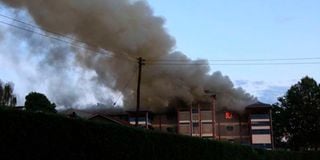Private schools urge talks on school unrest, raise doubts about caning

A burning dormitory at Karima Boys High School in Nyeri on November 27, 2021. Private schools have accused senior education officials of making ‘knee-jerk’ responses to the crisis in schools.
Private schools have accused senior education officials of making ‘knee-jerk’ responses to the crisis in schools, citing the push to restore the cane as a disciplinary measure.
Speaking after Cabinet secretaries George Magoha (Education) and Fred Matiang’i (Interior) urged the return of corporal punishment in efforts to restore discipline in learning institutions, private schools say the solution lies with the Ministry of Education.
They say officials need to decongest crowded public schools as a first step to easing the pressure on the institutions, which they say could help avert and contain unrest.
They also called for a national conversation on the emerging issues attributed to student conduct, as opposed to pushing for the return of the cane.
Corporal Punishment
They spoke as stakeholders in the education sector continued to give mixed reactions to calls by Prof Magoha and Dr Matiang’i to reintroduce corporal punishment in schools.
The two, speaking in Kisii on Monday, said the cane would be one way of restoring discipline and order in schools, citing themselves as good examples of the value of caning children.
They also called for a national conversation on parenting, noting that parents have failed to instil discipline in their children, hiding behind a human-rights argument.
"We cannot afford to have students running amok in schools unchecked. We cannot afford to have thugs in schools in the name of human rights," Prof Magoha had said.
Dr Matiang’i said that the human-rights argument has been hyped at the expense of children's future when it comes to discipline.
Overcrowded schools
But according to Kenya Private Schools Association (KPSA), schools are overcrowded and available resources are strained, resulting in infrastructural and administrative problems that are fueling chaos in schools.
Mr Charles Ochome, the new national chairman of KPSA, an umbrella body for private education institutions, including pre-primary, primary, secondary, and teacher-training institutions, said schools are so congested that “some look like colleges with departmental heads with over 2,000 students."
“This situation is creating pressure and that is why the government needs to decongest and place these children in private schools where there are spaces,” said Mr Ochome, who sits on the boards of some schools.
Most public schools are characterised by high student populations, affecting the teacher-to student-ratio and stretching available resources.
Mr Ochome suggested that private schools be considered for capitation to help in managing the affairs of students.
Parental guidance
He also called on parents to guide their children well, especially during school holidays.
“This madness of burning schools is a sad affair. We were taught not to burn houses but these ones are burning down dormitories, meaning some parenting was not done right,” said Mr Ochome, who is also the director of Golden Elites schools.
He called for a thorough conversation on solutions to the unrest, saying caning might not be the silver bullet to deal with the tragedies and student behaviour.
“I am not opposing caning in schools, but we need to ask why it was banned and that is why we must have public participation bringing together all stakeholders to weigh in on how it can be implemented,” said Mr Ochome.
E-learning product
Representatives of private schools spoke at a Kisumu forum, where Estonia’s ambassador to Kenya, Ms Kadri Humal-Ayal, met those from Western Kenya on an e-learning product called Opiq.
Mrs Ayal, the liaison officer for Opiq in the East African region, took schools through the product as part of a piloting project in Kisumu and Ugenya.
“We have a digital learning environment that has content from Kenyan publishers digitised in an interactive way, allowing the pupils to have more engaging studies and teachers to have flexibility on how they tutor students,” Ms Ayal said.
If successful, the programme will be launched across the country.





